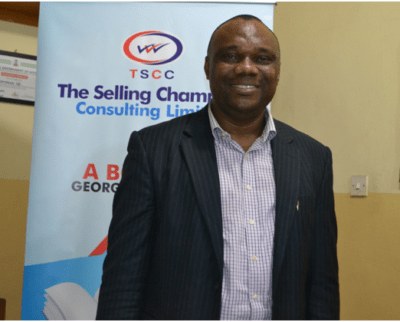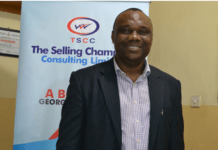(Contd from last edition)

The prospect or customer will show objection because they want to get good deals. People want to get great deals; for this reason, they usually come up with objections. The sales person must be professional in handling objections or even rejection.
Sometimes salespeople experience outright rejection, which is more severe. Rejection simply means: “I don’t want to do business with you!” The sales rejection scenario doesn’t give the salesperson an opportunity to explore tactics. It’s case closed! However, even when this is the case, be happy and move on. I agree with Brian Tracy’s thoughts in handling objections when he said, ‘‘Some will, some won’t, so what? Next!’’
But in all this, the salesperson must keep moving forward because there is a sales target to meet. He should be confident, believable, detailed and likeable. The right attitude reduces sales objection.
Handling sales objection professionally follows a sequence. We teach the following sequence in handling sales objection.
Hear the prospect out: Listen to understand him.
Qualify if it’s a true objection: Find out the objection(s) you are dealing with.
Gently explore and answer the objections: Take care of the objection.
See if the objection is handled: Find out from the buyer if the issue is dealt with.
Lead him to a close: Ask for the order; don’t just assume he will buy after the process.
I wrote thus in the 11th Law of The 25 Unbreakable Laws of Sales: ‘‘If you sold without objection, you probably sold to your uncle!’’ I think our uncles are even showing objections today! You have to prepare adequately before going to the field.
Ask for the order and close the sale
As explained in objection handling techniques, asking for the order closes the sequence in handling sales objection. In sales, you don’t assume they will buy. You must create the environment that will enable the sales to happen.
Asking for the order leads to closing the sale. You ask for the order professionally and in a way the prospect will say, “yes, I want it!”
But before you get to the level of asking the order that will lead to closing the sales, you must ensure that you met the closing requirements, which are:
The buyer must need what you are selling: If there is no need, there will be no sale.
The buyer must believe in you, in your product and in your company: Trust is imperative.
The buyer must be able to use the product you are selling: He can’t buy what he can’t use.
The buyer must be able to afford what you are selling: Ability to pay is real selling!
Follow up for resell and referrals
Following up for resell and asking for referrals is the last item in the sales process. Selling doesn’t end in selling only once; what I call “one-off selling”. You need to sell and sell again and again. You need to also take it to the next level of asking your customers to recommend you to their friends or people they know will need your products or services.
Making buyers to buy again is a function of their experience with the first purchase. A happy customer will buy again. A repeat customer is a satisfied customer. When customers are happy, they will continue to buy.
Winning customers to your side is in product performance and relationship management. The more your products and services meet or exceed the expectations of prospects and customers, the more they buy. They more you maintain a robust business relationship with your prospects and customers, the more you sell to them.
Sales referrals is what I have done successfully and it is a winning sales strategy. Sales referrals work because they help bridge the trust gap between the salesperson and the referred prospect. The challenge is that many sales professionals don’t ask for referrals. The two main reasons for this are fear and ego. They fear rejection, they are afraid of negative feedback. The second reason is ego issues. They are too big to ask! Asking this simple question will likely help your sales activities: ‘‘Do you know anyone else who might benefit from my products?”
A recent study by Bain & Co. indicates that 87 per cent of contented customers would pass along names, but only 7 per cent of sales reps ever asked them. Asking for referrals is a smart selling strategy.
The advantage of a referral is that it leverages the existing goodwill. A referred prospect already has confidence in you, your company, or your product. I call this transferred trust. I wrote about it extensively in The Selling Champion. Transferred trust depends on the confidence built on the person referring the prospect. Thus, referred prospects will naturally move through the purchase process at a faster rate than cold calling scenario.
We have experienced this on several occasions as a leading player in the training and consulting industry. Several jobs we got came from referrals. Politely ask for a referral when you delight a customer. It is advanced selling strategy. You can’t be sales wrong when you ask for referrals.
George O. Emetuche, CES, is a Brian Tracy endorsed serial bestselling author, accredited training consultant, business coach, sales and marketing consultant; and convener of Nigeria Sales Conference. Buy Books by George O. Emetuche at Alpha Pharmacy and Stores, and Roban Stores Nationwide, and popular bookshops near you. You can buy our e-books at Jumia, Amazon, Okadabooks, Kobo, and Bambooks. Reach us today on 07060559429 for productive training of your Sales Team and other professionals. www.thesellingchampionconsulting.com.









Great summary of the sales process.